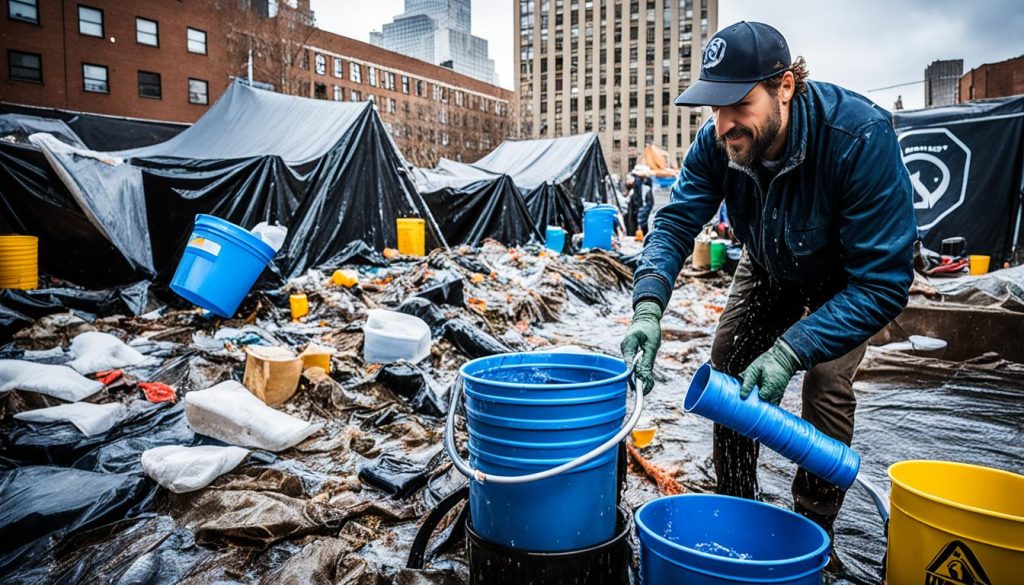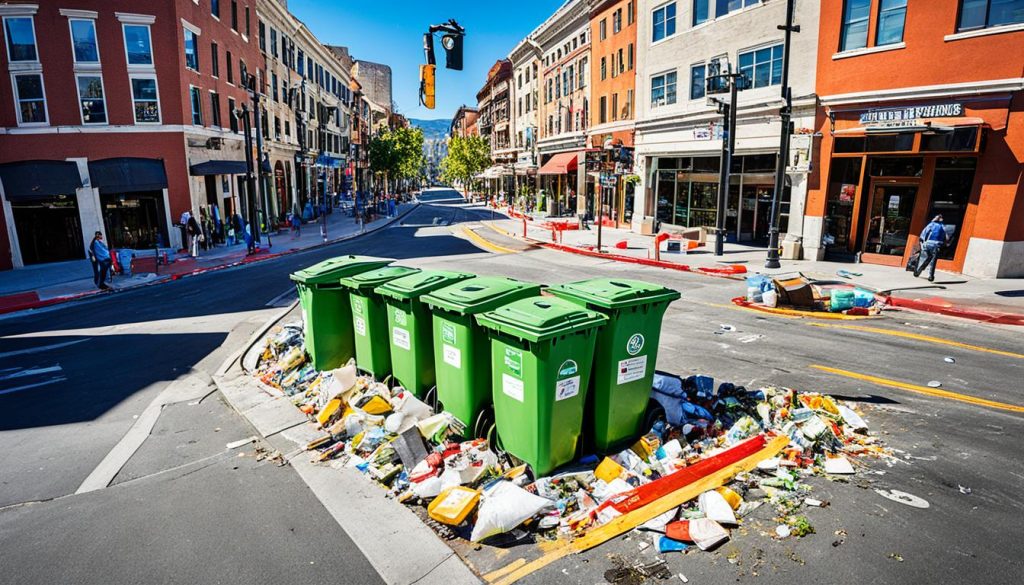Did you know that over 35% of the world’s population lacks access to improved sanitation? The lack of proper sanitation in urban survival situations can lead to the spread of diseases and pose a significant threat to public health. Inadequate waste management systems and poor hygiene practices can create unsanitary conditions, making it crucial to prioritize urban sanitation management.
Key Takeaways:
- Urban sanitation management is critical for maintaining hygiene and public health in cities.
- Over 35% of the world’s population lacks access to improved sanitation.
- Inadequate waste management systems can lead to the accumulation of municipal solid waste and health risks.
- Proper sanitation practices and personal hygiene habits are essential for preventing the spread of diseases.
- Sustainable urban sanitation solutions and the use of essential oils can contribute to long-term cleanliness and public health.
The Importance of Urban Sanitation Management
Urban sanitation management plays a critical role in maintaining the cleanliness and public health of cities. Inadequate waste management systems can lead to the accumulation of municipal solid waste, which poses health and environmental risks. City sanitation services are responsible for the collection and disposal of waste, ensuring proper sanitation practices in urban areas. Without these services, waste materials can pile up, leading to unsanitary conditions and the spread of diseases. It is essential to prioritize sanitation in urban environments to prevent health hazards and maintain a clean and safe living environment.
Challenges of Municipal Solid Waste Disposal
Municipal solid waste disposal is a significant challenge for urban sanitation management. In densely populated cities, large quantities of waste are generated daily, requiring efficient systems for collection, transportation, and disposal. Without proper waste management, uncollected waste can accumulate on streets, parks, and other public spaces, causing environmental pollution and attracting pests and vermin. Additionally, the decomposition of organic waste can release greenhouse gases and contribute to climate change.
“Inadequate waste management systems can lead to the accumulation of municipal solid waste, which poses health and environmental risks.”
City sanitation services play a crucial role in addressing these challenges. They are responsible for establishing waste collection schedules, ensuring waste segregation, and providing suitable disposal facilities. By implementing efficient municipal solid waste disposal practices, cities can minimize the impact of waste on the environment and improve the overall quality of life for urban residents.
The Role of City Sanitation Services
City sanitation services are vital for urban sanitation management. They are responsible for ensuring proper waste collection, transportation, and disposal, as well as maintaining cleanliness in public areas. These services employ waste management professionals who are trained to handle different types of waste, including hazardous materials.
City sanitation services typically include:
- Regular waste collection from residential, commercial, and industrial areas
- Proper segregation of waste to facilitate recycling and proper disposal
- Transportation of waste to treatment facilities or landfill sites
- Maintenance and cleaning of public spaces
- Management of hazardous waste
Table: City Sanitation Services
| Service | Description |
|---|---|
| Waste Collection | Regular collection of waste from residential, commercial, and industrial areas. |
| Waste Segregation | Separation of waste into different categories for recycling and proper disposal. |
| Waste Transportation | Transporting waste to treatment facilities or landfill sites. |
| Public Space Cleaning | Maintenance and cleaning of public areas to ensure cleanliness and hygiene. |
| Hazardous Waste Management | Specialized handling and disposal of hazardous waste materials. |
City sanitation services work closely with local government authorities and health departments to ensure that waste is properly managed and sanitary conditions are maintained. By providing these essential services, cities can safeguard public health, protect the environment, and create livable urban spaces.
Sustainable Urban Sanitation Solutions
Sustainable urban sanitation solutions are crucial for ensuring long-term cleanliness and public health in urban areas. These solutions focus on implementing efficient sewage treatment methods, promoting recycling and reuse of waste materials, and adopting eco-friendly practices. By incorporating sustainable urban sanitation practices, cities can minimize pollution, conserve resources, and improve overall sanitation conditions.
The Importance of Efficient Sewage Treatment Methods
An essential aspect of sustainable urban sanitation management is the adoption of efficient sewage treatment methods. Traditional sewage treatment typically involves the collection and transportation of wastewater to centralized treatment plants. However, this approach requires extensive infrastructure and energy consumption. To address these challenges, innovative wastewater treatment technologies have emerged, such as decentralized treatment systems that can treat wastewater locally. These systems utilize natural processes to remove pollutants and promote the proper treatment and disposal of wastewater.
Recycling and Reuse of Waste Materials
In sustainable urban sanitation management, recycling and reuse of waste materials play a crucial role in reducing environmental impact. By implementing effective waste separation and recycling programs, cities can minimize the amount of waste sent to landfills. Additionally, the conversion of organic waste into compost can provide valuable fertilizer for urban agriculture and landscaping. Reusing treated wastewater for non-potable purposes, such as irrigation, can also conserve water resources and reduce the strain on freshwater supplies.
Promoting Eco-Friendly Practices
Education and awareness about eco-friendly practices are vital components of sustainable urban sanitation solutions. Encouraging water conservation practices, such as installing water-efficient fixtures and utilizing rainwater harvesting systems, can help reduce water consumption. Implementing proper waste management techniques, including composting, recycling, and responsible disposal, can also contribute to a cleaner and healthier urban environment. By fostering a culture of environmental stewardship, cities can empower individuals to actively participate in sustainable sanitation practices.
Comparison of Sustainable Urban Sanitation Solutions
| Solution | Benefits |
|---|---|
| Decentralized sewage treatment systems | – Lower infrastructure and energy requirements – Reduced transportation costs and carbon footprint – Localized treatment and reuse of wastewater |
| Waste separation and recycling programs | – Minimized waste sent to landfills – Conservation of natural resources – Reduction of greenhouse gas emissions |
| Composting of organic waste | – Production of nutrient-rich compost for urban agriculture – Reduction of methane emissions from landfills – Conservation of soil health |
| Reuse of treated wastewater | – Conservation of freshwater resources – Cost-effective alternative for non-potable use – Reduced strain on water supply infrastructure |
Maintaining Personal Hygiene in Urban Survival Situations
When it comes to urban survival situations, personal hygiene plays a crucial role in protecting individuals from diseases and maintaining their overall well-being. In this section, we will explore the importance of practicing good hygiene habits and the essential steps to maintain personal hygiene in urban environments.
Practicing Good Hygiene Habits
“Proper hygiene practices are essential for preventing the spread of diseases and ensuring the health of individuals in urban survival situations.”
One of the fundamental hygiene practices is regular handwashing with soap and water. It is recommended to wash hands before preparing or consuming food, after using the toilet, and whenever hands come in contact with potential contaminants. In situations where water is scarce, using hand sanitizers with at least 60% alcohol content can be an alternative.
Oral hygiene is equally important in urban survival situations to prevent dental problems and maintain overall health. Regular brushing of teeth with toothpaste and flossing can help remove plaque, prevent tooth decay, and reduce the risk of gum diseases.
Maintaining Clean Clothing and Proper Waste Disposal
“Clean clothing and proper waste disposal are crucial aspects of maintaining personal hygiene in urban environments.”
Keeping clothing clean is essential to prevent the accumulation of dirt, sweat, and bacteria that can lead to skin infections and odor. In urban survival situations, it is advisable to have spare clothing and practice regular washing or changing of clothes to maintain cleanliness.
Proper waste disposal is another significant aspect of personal hygiene. It is vital to dispose of waste in designated areas to prevent the spread of diseases and maintain a clean living environment. Using garbage bags and following local waste management guidelines can contribute to effective waste disposal in urban settings.
Essential Steps for Personal Hygiene in Urban Survival Situations
| Hygiene Practice | Description |
|---|---|
| Handwashing | Regular handwashing with soap and water or using hand sanitizers |
| Oral Hygiene | Regular brushing of teeth and flossing |
| Clean Clothing | Regular washing of clothes and having spare clothing |
| Proper Waste Disposal | Disposing of waste in designated areas and following waste management guidelines |
By practicing good hygiene habits, maintaining clean clothing, and following proper waste disposal methods, individuals can protect themselves from diseases and promote a cleaner and healthier urban environment.
Addressing Sanitation Issues in Earthquake-Prone Areas
Earthquake-prone areas present unique challenges in urban sanitation management, as the potential damage to water and sewer systems can disrupt the normal sanitation infrastructure. In such areas, it becomes imperative to have alternative systems in place to ensure access to clean water and proper waste disposal.
One effective solution is the implementation of twin-bucket toilet systems, which provide a hygienic and environmentally friendly way to manage human waste in the absence of functioning sewage systems. This system involves the use of two separate buckets—one for urine and another for solid waste—which are then emptied and cleaned regularly.
Hand-washing stations also play a crucial role in maintaining hygiene, especially in earthquake-affected areas where access to clean water may be limited. These stations should be equipped with soap and water or alcohol-based hand sanitizers to promote proper hand hygiene and prevent the spread of diseases.
Additionally, the use of natural resources can contribute to addressing sanitation issues in earthquake-prone areas. Evergreen plants, with their antimicrobial properties, can be utilized for cleaning purposes. By harnessing the natural cleaning properties of plants, communities can reduce their reliance on chemical cleaners and promote a more sustainable approach to sanitation management.
Emergency management agencies in earthquake-prone areas are actively working to raise awareness and provide guidance on sanitation solutions in the event of a disaster. By educating the public on sanitation best practices and implementing effective sanitation programs, these agencies aim to mitigate health risks and ensure the well-being of affected populations.
| Challenges in Earthquake-Prone Areas | Solutions |
|---|---|
| Potential damage to water and sewer systems | Implementation of twin-bucket toilet systems |
| Limited access to clean water | Provision of hand-washing stations with soap and water or hand sanitizers |
| Disruption of sanitation infrastructure | Utilization of natural resources like evergreen plants for cleaning purposes |
The Role of Essential Oils in Natural Cleaning
Essential oils offer a natural and effective solution for urban sanitation management. These oils, such as Clove, Litsea Cubeba, and Cedarwood, are renowned for their antiseptic, antiviral, and antibacterial properties, making them ideal for disinfection, hand sanitizing, and wound cleansing.
In addition to essential oils, evergreen plants like cedar, juniper, pine, and fir also possess natural antibacterial properties. They can be used to create herbal soap teas that are effective for cleaning purposes.
Another sustainable option for personal hygiene and cleaning in survival situations is natural soap made from ingredients like yucca. This type of soap not only cleans effectively but also reduces the environmental impact through its eco-friendly formulation.
By harnessing the power of essential oils and natural cleaning products, urban sanitation management can be enhanced, promoting a healthier and cleaner living environment.
Conclusion
Proper urban sanitation management plays a vital role in maintaining hygiene and public health in cities. By implementing adequate waste management systems, sustainable sanitation solutions, and promoting personal hygiene practices, cities can create a clean and safe living environment while preventing the spread of diseases.
Prioritizing sanitation in urban survival situations is crucial. Stockpiling necessary items such as toilet buckets, composting toilets, toilet paper, garbage bags, soap, hand sanitizers, and cleaning supplies can help ensure sanitation needs are met even in challenging circumstances.
Furthermore, by adopting sustainable practices and raising awareness about sanitation issues, cities can promote a clean and healthy urban environment. This includes efficient sewage treatment methods, recycling and reusing waste materials, and the promotion of water conservation and proper waste disposal. By incorporating these strategies into urban sanitation programs, cities can minimize pollution, conserve resources, and improve overall sanitation conditions for their residents.
In conclusion, sustainable urban sanitation is essential for the well-being of city dwellers. By prioritizing urban sanitation management, implementing sustainable solutions, and promoting personal hygiene practices, we can create healthier, cleaner, and more livable cities for everyone.



